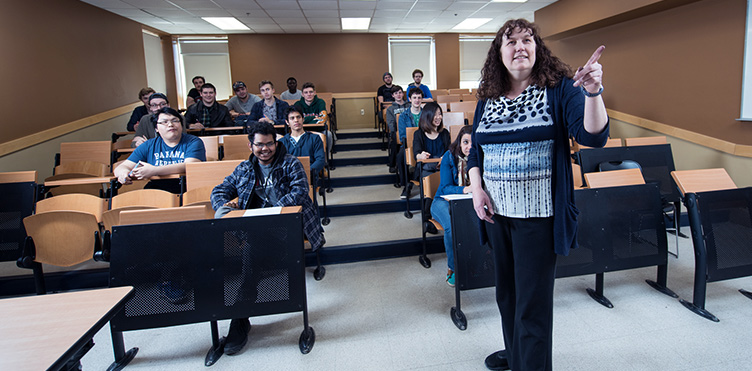Undergraduate programs in CS

We have credentials ranging from minors to full four-year degree programs, including honours options.
Computer science
Our computer science program includes our four-year Bachelor of Science in Computer Science (BScCS) degree, which can be entirely completed in Saint John.
If you are interested in learning more about computer networking, software engineering or data analytics, we also offer specializations in these areas within the BScCS.
We have expertise and related courses to choose from in areas such as:
- Artificial intelligence
- Cybersecurity Risk Management
- Data management
- Data mining (including machine learning)
- Web science
We ensure that you are well prepared for a career in computer science, with an emphasis on critical thinking, the development of research and presentation skills, the use of various operating systems (Windows and Linux) as well as a variety of programming languages (Java, C/C++, Python), and the use of development tools used in industry such as: GitHub, IntelliJ IDEA and other IDEs from JetBrains, etc.
UNB Saint John has entered into an academic partnership with Visual Paradigm to better facilitate the teaching of software design through the use of Visual Paradigm.
CS program options
Honours for BScCS
Honours for the BScCS requires that students choose their electives to include more advanced courses, an honours thesis and have a higher GPA than the basic BScCS degree. Students completing the honours option will be better prepared for graduate school.
With proper degree planning, adding the honours option will not delay graduation. In fact, there is a provision in the UNB masters in CS to allow approved honours students to begin work toward their masters while completing their honours requirements, which reduces the time necessary to achieve a masters in CS.
Co-op experience
The benefits of hands-on work experience in computing, as well as the earned income, are available to interested BScCS students.
This is done via a pilot program offered in conjunction with the co-op office of the Faculty of Business at UNB Saint John. Our students can take part in the same job and interview preparation workshops as the business students and the business co-op office collects requests from employers for CS students and coordinates interviews.
The department is currently considering whether to request that the co-op designation become an official option printed on students' degrees, rather than merely having co-op work terms noted on the students' transcripts.
Campus and degree program transfer opportunities
The full four year BScCS degree began in Saint John around the year 2000, but UNB Saint John students continue to have the traditional option of starting the Fredericton BCS (Bachelor of Computer Science) degree in Saint John and then transferring to the Fredericton campus for degree completion.
For many Saint John area students, this has been a more economical way to earn the BCS degree. The differences between the BScCS and BCS are relatively small and largely exist at the level of the optional specializations offered by the two campuses.
To allow students in the BCS to switch easily to BScCS, or vice versa, our department has ensured that the courses taken in the first two years of both degrees are almost the same. Instructors on both campuses compare notes and typically choose the same textbooks (and topics covered), in order to achieve a smooth transition for students who choose to move between the two main UNB campuses in their first two years.
Certificates and minor programs
We also have a certificate in computing that contains some of the more practically oriented lower-level courses. It is appropriate for students who are uncertain whether they want to pursue a full BScCS, or for students who may not currently meet the entrance requirements for the BScCS. See the calendar section on the certificate in computing for details.
Finally, we have a minor in CS for students in other degree programs, including BA, BSc and BBA. Please refer to the online calendar sections for details on the Minor in CS.
Data analytics
With the recent growth in the importance of big data and our 35-year experience with the Data Analysis (more recently Information Sciences) degree, we have revised our long-time Certificate in Data Analysis to focus on the key needs for today's big data problems. We also pull in expertise in applied statistics from the Department of Mathematics and Statistics.
The resulting Certificate in Data Analytics was approved in 2015 by the Maritime Provinces Higher Education Council. The first student graduated in October 2016.
This certificate is meant for students having a previous background in computer science, engineering, business, or science, or students currently in their final year of such a degree and who are interested in upgrading their skills to be able to analyze data in their field. Those with a high school education and relevant industry experience are also welcome to this program.
